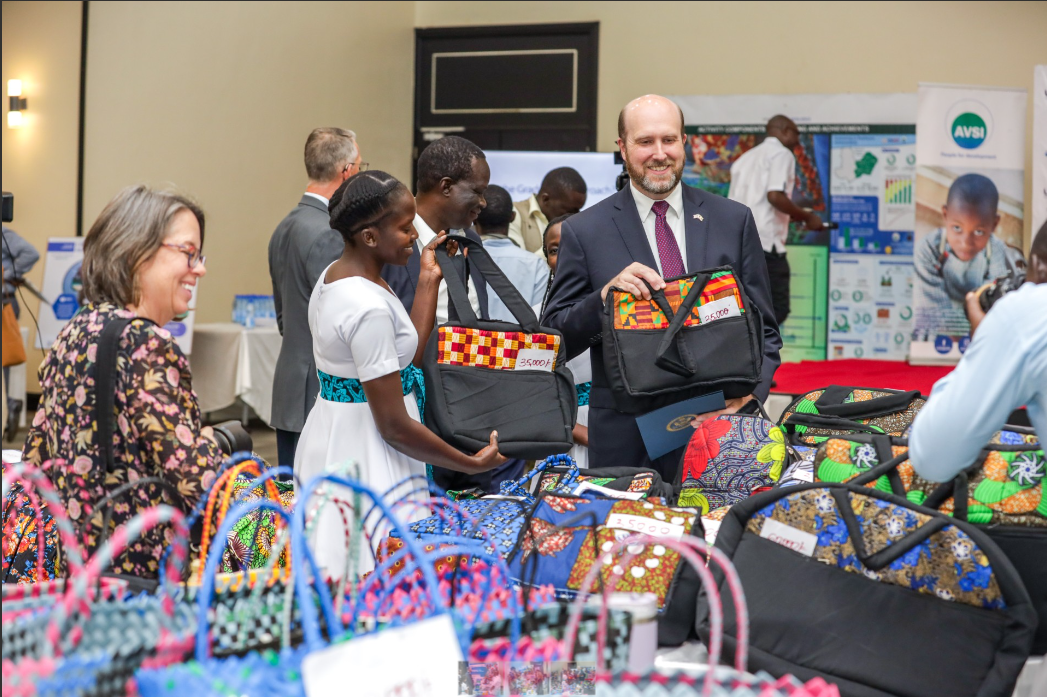
Our Resilience Pathways: Graduation Marketplace: A Showcase of Success and Effective Innovation
From August 6-8, 2024, USAID-Graduating to Resilience Activityhosted the “Graduation Marketplace” event at the Mestil Hotel in Kampala. This event, titled “Our Resilience Pathways”marks the conclusion of a transformative seven-year initiative aimed at reducing poverty among refugee and host community households in Kamwenge District.
The marketplace was designed to share experiences, tools and materials from the USAID-Graduating to Resilience Activity which utilized the Graduation Approach for poverty reduction. The approach successfully transitioned 80% of 13,680 households from extreme poverty to self-reliance and resilience in Kamwenge, Uganda’s southwestern district. “We celebrate the achievements, best practices and experiences of the Graduation Approach in Uganda,” stated H.E William W. Popp, the United States Government Ambassador to Uganda, who inaugurated the event.
The Graduation Approach is a sequenced, time-bound intervention that helps people living in extreme poverty build resilience and sustainable livelihoods. In Uganda, the USAID-Graduating to Resilience Activity (GRAD) has registered several positive outcomes, including graduating 80% of households from poverty, achieving a 96% self-efficacy rate, and a 96.4% business diversification rate.
Over three days, the marketplace featured interactive booths demonstrating the Graduation Approach from design to implementation. Activity staff at the booths shared experiences, tools, and materials from the seven-year initiative, which was implemented within the Rwamwanja refugee settlement by a consortium led by AVSI Foundation in partnership with Trickle Up, and American Institutes for Research.
The Graduating to Resilience Activity has been a journey of transformation, with remarkable outcomes that extend beyond the families being able to afford their basic needs to resilience. According to the Activity’s Chief of Party, Rita Larok, “96% of female participants felt they were more confident in achieving the future they wanted for themselves and their families.” This empowerment has been a critical factor in the success of the program. “Teamwork is crucial from the genesis of the program. It was impressive to see everyone engage and discuss their contributions during such public space which is an additional layer of authenticity,” Larok added.
87% of businesses were diversified and the financial literacy skills helped the participants to generate 1.8 million US$ in cumulative savings over the seven-year program period. These figures highlight the economic empowerment and resilience achieved by participants. The economic progress is further evidenced by 96% of children in the program having enough food to eat and 99% of households maintaining a balanced diet.
The marketplace event not only celebrates these achievements but also works to see funding and policy trends support robust graduation program designs to transition extremely poor populations toward self-reliance and resilience in various contexts. ” The U.S. Government remains committed to creatively solving these challenges through activities like Graduating to Resilience. We are eager to share the evidence and guidance to program designers, policy makers and advocacy specialists at different levels of society to scale this approach.,” stated H.E. William W. Popp.
Over 300 participants visited the booths and engaged with program staff and other stakeholders for a deeper understanding of the Graduation Approach and its practical applications. This engagement is crucial for scaling the program to different communities in Uganda and beyond.Glynnis Melnicove, the Monitoring, Evaluation and Learning manageratthe AmericanInstitute for Research, expressed her exhilaration about the event’s impact, stating, “I am thrilled to be part of this market event. It has been incredibly informative for the participants who I have interacted with throughout the three days. The broader community’s exposure to AVSI’s work and its partners is truly gratifying.” Reflecting on her involvement over the past two and a half years, Melnicove highlighted the value of evidence generation and sharing insights with other organizations looking to adopt the graduation approach. “Creating a market for people to learn has been instrumental in achieving our goal of disseminating our work,” she added.
Asaad Taha from Trickle Up mentioned that the approach inspired him to consider engaging young professionals and inspiring both undergraduate and postgraduate students—whether from international or local institutions which is critical for cross-generational skills and knowledge transfer. This focus ensures that the program willbenefit stakeholders and empowers the next generation of our sector proffesionals to carry forward the humanitarian mission with fresh perspectives and energy.
One notable story shared by H.E William W. Popp highlights the transformative impact on individuals: “The most inspiring aspect of this program is the changes we have seen in the lives of Ugandan and refugee women, children, and families who participate in this program. Participating Ugandan communities came together to help people who have been traumatized by war and forced to flee their homes.”
The Graduating to Resilience Activity has shown that with the right support, people can move from extreme poverty to a state of self-reliance and resilience. As we look to the future, the lessons learned and successes achieved in Uganda should serve as a blueprint for similar initiatives worldwide.
“Our Resilience Pathways” marketplace event was not just a celebration of past achievements but a call to action for future endeavors in uplifting the conditions of refugee and surrounding communities. It embodies the hope and resilience of the communities it has served and sets stage for continued progress in the fight against poverty.
About the Authors
Belshazzar Katorobo, Olive Ngamita and Racheal Akiteng are Communication Specialists at AVSI Foundation in Uganda, a non-profit organization that carries out development cooperation and humanitarian aid projects. Across 40 countries, AVSI Foundation works for a world in which every person is the protagonist of their integral development and that of their community, even in emergency contexts.



